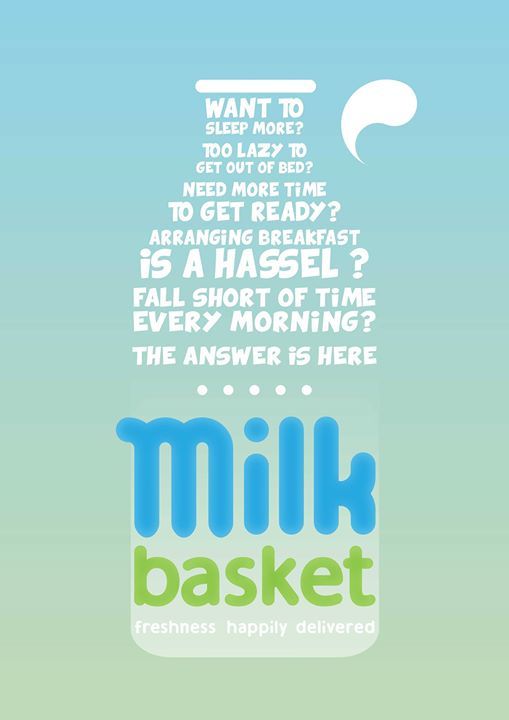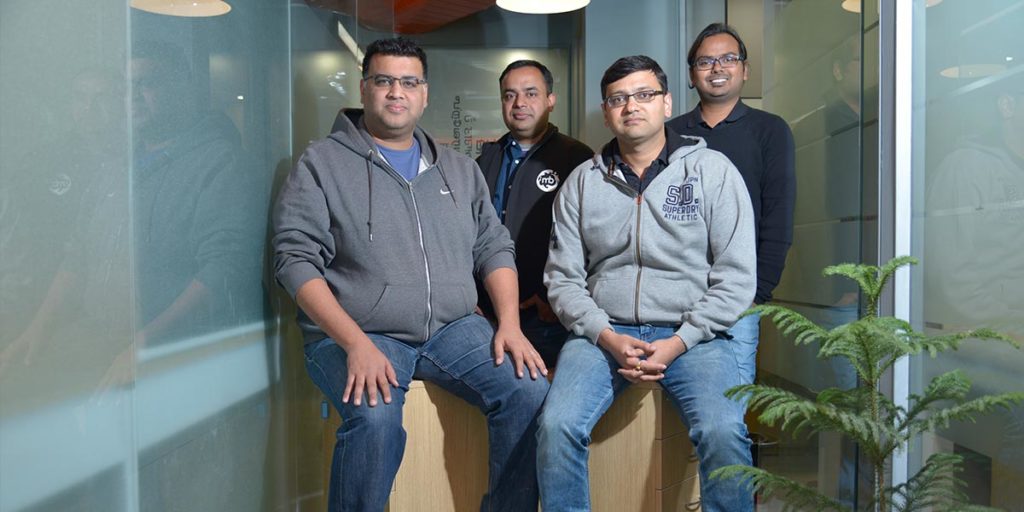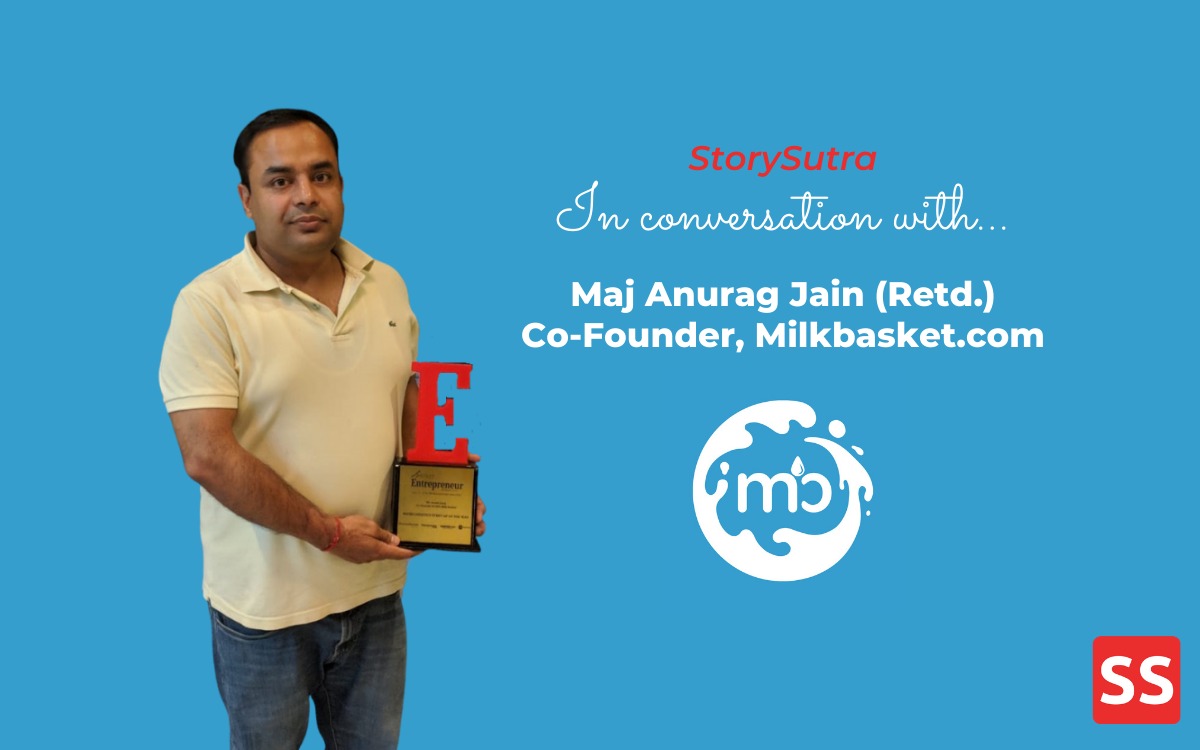TheShareStory.in is an initiative to build a community of Entrepreneurs, Founders, Startups & Industry Stalwarts to celebrate success & to learn from shortfalls, and to Contribute, Inspire & Embellish Entrepreneurship by sharing their exciting Stories!
As a part of our initiative, we invited one of India’s most passionate entrepreneurs, Mr. Anurag Jain, who has also served in the Indian Army for the better part of a decade. We asked him for an interview with us, to understand more about his brilliant entrepreneurial journey, as the Co-Founder of the millennial grocery-delivery startup MilkBasket. Let’s learn more about his exciting journey, his background and his advice for our growing community –

Tell us a little bit about yourself and your journey, please;
Twenty years ago, when I graduated from NIT Kurukshetra as a civil engineer, I had no clue that this was the rollercoaster ride that I was going to face.
I had cleared my MTech and had joined the School of Planning and Architecture in New Delhi, when I got an interview call from the elite forces of the Indian Army. I belong to a Jain family with no relation to the armed forces, but still, I was one of the two candidates selected from our batch to join the forces.
Thereafter, it was a remarkable experience with the Indian Army where they teach you more than you could ever imagine. After 5 years of service, I decided to move out and did a course from XLRI, Jamshedpur.
Somehow, I landed up with a job offer as “Projects Manager” for Spencer’s Retail Limited. I then started making retail stores for many of us to shop. I went on to make multiplexes with Cinepolis India and more retail stores for Vishal Mega Mart and Samsung Electronics.
It was then I met Anant Goel who is the CEO and Co-Founder at Milkbasket, and he persuaded me to join this unknown concept of grocery delivery.
What was your key driving force to become an entrepreneur?
The key factor to become an entrepreneur was the passion towards doing something different and having the trust in the founding team to be able to pull it through.
It’s always a difficult decision to take the plunge and leave your comfortable job (which doesn’t mean that the job is easy but yes it pays you every month to run your household) and take this leap of faith to explore the “Unexplored territory”. Remind you that it’s not an easy journey by any means.

What are some of the most rewarding aspects of the job?
The most rewarding aspect is that in a start-up, the best part is that you get to don many hats. In the initial two years, I was leading the operations, managing the entire supply chain, handling human resource planning while also standing at canopies to onboard customers. The experience is totally invaluable.
Do you believe there is some sort of pattern or formula to becoming a successful entrepreneur?
No, there can never be a formula to success. It’s your passion, determination combined with lots of efforts put in the right direction that eventually result in success. Therefore, having the right people around you and having faith in your team and working together while valuing each other’s efforts is what drives a team forward. You need to be always be aware of the micro and macro factors while taking key decisions in a start-up.
You served in the army for six years. What incited you to make the drastic transition to entrepreneurship?
Yes, it is a totally different world when you compare an Army officer with an entrepreneur. However, the learnings from the Army are very relevant to an entrepreneur’s journey as well.
The Indian Army is an institution in itself bonded with camaraderie and spirit of brotherhood. You have officers and men from all parts of India and they just bond together during various courses, training exercises or while staying together in one station. Everyone shows mutual respect for each other and discipline & integrity are the core principals being followed. There is a sense of purpose and devotion to duty.
Apart from this, you get to learn how to manage people and resources even in the most challenging situations which in a civilian’s life, you will probably not even encounter once. So, overall, it is a life lesson to be a part of such wonderful organisation and I truly believe that Indian Army can simply bring out the “Best” in everyone.
I feel that’s how I was able to use my learnings and make a collaborative work culture in a start-up, where everyone considers the organisational goals as their own goals and works towards achieving them.
How did the idea of Milkbasket come upon?
The idea behind this concept was that in today’s world, everyone is short for time, and buying groceries is such a mundane task, that people shouldn’t worry about, or have to plan for a buying cycle.
Along with this, the available options for online grocery buying were also very limited, and there was no facility where I could order a Rs. 5 Parle-G pack at 12 midnight and still get it delivered at my doorstep the next morning even before I woke up.
Therefore, the unique delivery model that Milkbasket has pioneered gives us the competitive edge over our competitors. Along with this, I feel that keeping a customer satisfied with more than 20 touch points in a month with relentless execution and accuracy of supply chain definitely wins hearts and customer loyalty.
How is the journey building MilkBasket been so far? How did you disrupt this old-school business?
It has been a wonderful journey which every new startup founder can possibly dream of. I feel that it is a big achievement and we are all so proud of it. Obviously, this could not have been possible without having the support of a strong team backed up with even stronger processes. We are a “customer-centric organisation” and therefore, all our processes are designed to ensure that we become the most convenient way to shop groceries online. Our customers love the service as much as we do and therefore, we have grown at a steady pace in last 5 years.
When we started in the year 2015, everyone was eying groceries as an easy way to become a unicorn. However, in the process, they were burning a lot of money and were not exactly looking at the bottom-line. Therefore, we came up with a concept that was totally unique concept in India which we called as “Santa” delivery. We were the pioneers to deliver groceries in India in a contactless manner wherein the delivery boy simply leaves your grocery bag at your doorstep every morning before 7 am. What’s more, you can order your groceries as late as till midnight and whatever you order shall be delivered to you the next morning before 7 am. Along with all this, it was a “one-click” ordering process on the app where you can order anytime anywhere with just one click of the button. Such innovations have helped us stay ahead of the curve and to totally disrupt the old school business model.
What kind of culture exists in your organization, and how did you establish it?
The Organization is always driven by its people. Therefore, we promote a “people first” culture. Anyone and everyone need to feel part of a team and be recognised for the efforts and sacrifices made. You need to give them the authority to be independent while also being responsible for the task at hand. Listening to people and being the “problem solver” are the key skills that a leadership team must possess.
What business-related book has inspired you the most? (or, what is your favourite book?)
The Everything Store: Jeff Bezos and the Age of Amazon by Brad Stone is a wonderful read. It tells you how the vision of one man can completely change the future of the entire company.
What do you look for in an employee while expanding your team?
An employee has to be motivated, smarter than you yourself and should have the attitude to succeed. He should have the skills for the desired role and must be a team player to work in a collaborative environment.
What key activities would you recommend entrepreneurs to invest their time in?
The entrepreneurs need to ideate. They are the creators and therefore they need to constantly evaluate whether they are creating value for the intended end users by using their idea or not. You tend to get lost in daily execution as that’s also an important task, however aligning everyone to the organization’s vision is of prime importance.What is the toughest decision you had to make in the last few months?
During the pandemic times, it became very difficult for the operations team to work. However we had to continue the grocery delivery as this was an essential commodity and we had an opportunity to serve the society by allowing them to stay at home and stay safe. However, managing the entire operations, that too mostly night ops, when more than 500 employees work at one 50K sq. ft. hub was a challenge. The team took on itself and entire setup was done within days to ensure safety checks and precautions taken at every stage of operations and we were able to successfully continue the operations and even started a special delivery for the “senior citizens”.
A growing start-up in India that you would love to be a part of?
I think Byju’s is an exceptional start-up which is aimed at facilitating education to the young minds and is doing a commendable task of ensuring that much needed continuity of studies for today’s children. It will be my pleasure to be a part of this start-up.
What piece of advice would you give to college graduates who want to become entrepreneurs?
College graduates are the most energetic lot – they are vibrant and full of ideas. Although experience is not the most important ingredient for a successful start-up but yes, it plays a vital role. Therefore, I would suggest that a young graduate needs to channelise the energy and instinct into the right direction and be receptive to feedback from others. Sometimes you get obsessed with an idea so much that you do not evaluate whether it is the right market fit or not — or is the targeted audience the right set of audience who would value this product/idea/initiative.
What I can assure each one of you is that the start-up journey is never going to be an easy ride and it will be a unique experience for each one of you. What really matters is how you face the challenges and convert difficult situations into opportunities. That’s the difference between a successful start-up and a failed start-up.
